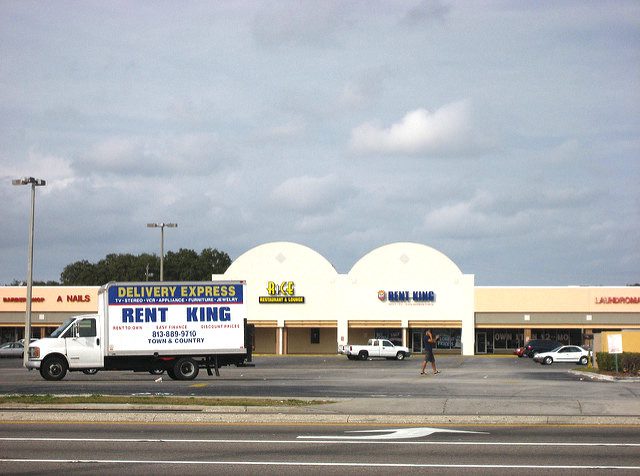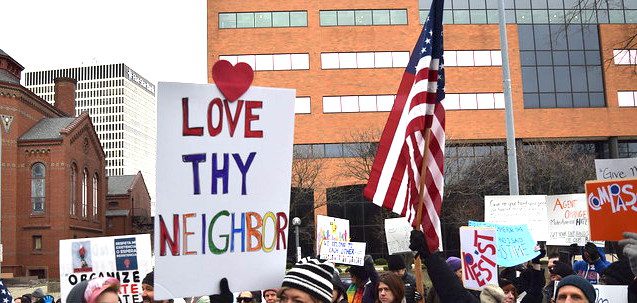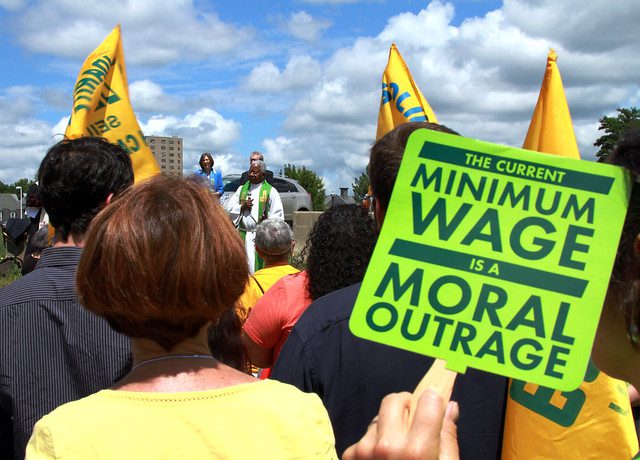
‘Rent King’ by Bill Rogers via flickr, CC BY-NC-ND 2.0
When you can’t pay a bill, you’d expect to have it go into collections, or have the item—if it’s a car, for example—repossessed. You wouldn’t expect to go to jail. But that’s exactly what’s happening in Pennsylvania as prosecutors pursue charges against hundreds of people who fall behind on their rent-to-own payments from companies like Rent-A-Center. We already know that these companies target low-income borrowers who can’t access credit to purchase items like appliances and furniture at traditional stores, making it so the poor pay several times more than a person who has enough cash or credit to buy the item outright. Now we’re adding court fees, fines, and criminal charges to the equation. And those charges could lead to issues in the future as many jobs refuse to employ people with records. What a mess.
A group of Whole Foods employees, frustrated about the change in culture of their workplace since the company’s acquisition by Amazon, have circulated a letter inviting coworkers to join them in organizing. The letter cites widespread layoffs, job consolidation, and the fact that lower-level employees were excluded from participating in profit sharing, and calls for certain guarantees such as a $15 minimum wage, equal profit sharing, and paid maternity leave. Could Amazon’s business—and employer—model help spark a new labor movement in our country?
A program in Portland encourages individuals who are panhandling on city streets to work instead. In its second year, the Opportunity Crews program hires individuals to perform clean up duties in public parks and spaces for the city’s minimum wage, and hopes to mirror an earlier-adopted program in New Mexico that resulted in full-time city work for over a dozen of its participants. In the meantime, the stated goal is to steer folks into scheduled work and connect them to other city services like housing and food programs.
There’s a great piece in the The New York Times about service workers who are earning a living wage thanks to a parity program at Harvard University that ended the outsourcing of certain jobs to save money. “Harvard’s experiment has led some economists and union organizers to think about similar arrangements to broadly benefit low-pay service workers, who form the biggest and fastest-growing part of the job market.” We’d love to see other institutions and businesses follow Harvard’s lead.
What happens when city officials fail to dedicate adequate oversight to a program designed to alleviate vacancy and provide homeownership opportunity to lower-income earners? One big, frustrating, enraging “oops” that likely can’t be undone anytime soon. As it turns out, an unknown number of the 400 or so homes built on city-acquired land and set aside for affordable housing by the Houston Land Bank may have owners whose income exceeded the limit to qualify. Other problems include real estate investors renting out the homes, and owners selling their homes before the 10-year ownership requirement—unbeknownst to the land bank and thus outside of their permanent affordability mandate. It was the Houston Chronicle’s reporting, and pressing officials on the situation, that uncovered this fail that’s resulted in a blow to attempts to create more affordable housing for low-income and working-class residents in an increasingly unaffordable city.
Last summer, shocking video and photos of living conditions inside the Garden Spires housing complex in Newark sparked outrage throughout the state and a renewed discussion about housing for the poor, sick, and elderly. It came along with a legal complaint by local officials and Garden Spires tenants that prompted the city to file a lawsuit against the owners of the federally assisted properties and HUD, citing unhealthy and dangerous living conditions. Last week, the state announced that Garden Spires now has a new owner, and will receive over $170 million in state funds to make long-neglected repairs and renovations. HUD also announced an $800,000 settlement with the development’s former owners for not complying with federal lead disclosure rules.
What else we’re reading: This New York Times Magazine piece on the reasons why poverty numbers won’t go down and the the growing population of working people holding full-time jobs who cannot afford life’s basic necessities of shelter and food.




Comments